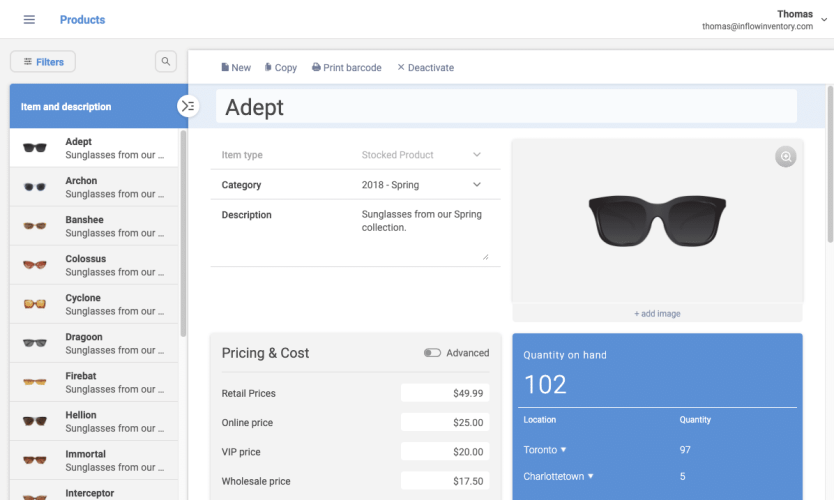How Inventory Management Software Can Transform Your Business
Effective inventory management is a cornerstone of any successful business. Companies of all sizes face challenges in maintaining the right stock levels, tracking product movement, and optimizing supply chain operations. Without proper management, businesses risk overstocking, stockouts, or lost sales. Inventory management software and systems are essential solutions that address these challenges, helping businesses streamline operations, reduce costs, and improve overall efficiency.
What Is an Inventory Management System?
An inventory management system is a software solution designed to track and manage inventory throughout the entire supply chain. It enables businesses to monitor stock levels, manage orders, and track product movement in real-time. Unlike manual tracking methods, an inventory management system provides accurate, automated data, reducing human error and improving operational decision-making.
Modern inventory management software often integrates with other business tools such as e-commerce platforms, accounting software, and point-of-sale systems. This integration allows seamless data flow, providing a comprehensive overview of inventory, sales, and procurement activities.
Why Businesses Need Inventory Management Software
The adoption of inventory management software brings numerous advantages to businesses, including:
1. Accurate Inventory Tracking
Manual inventory tracking can be prone to errors, which may lead to discrepancies, financial loss, and poor customer satisfaction. An inventory management system provides real-time updates on stock levels, ensuring that businesses always have accurate and reliable inventory information.
2. Improved Operational Efficiency
Inventory management software automates repetitive tasks such as updating stock records, generating purchase orders, and creating reports. Automation frees up employees to focus on strategic activities, increasing overall productivity.
3. Cost Reduction
Maintaining optimal inventory levels prevents overstocking and understocking, both of which can negatively affect a business’s finances. By analyzing inventory turnover and demand patterns, the best inventory management software helps businesses save on storage costs, minimize waste, and optimize procurement.
4. Demand Forecasting
Many inventory management systems offer advanced analytics and reporting tools that forecast future demand based on historical data, seasonal trends, and market patterns. Accurate forecasting allows businesses to plan purchases effectively and avoid stock-related issues.
5. Enhanced Customer Satisfaction
Customers expect products to be available when needed. By implementing an inventory management system, businesses can ensure timely order fulfillment, reduce backorders, and provide a seamless customer experience.
Key Features of the Best Inventory Management Software
The best inventory management software includes features that make inventory tracking and management more efficient and reliable. Some of the most important features are:
Real-Time Stock Monitoring
Real-time monitoring allows businesses to track inventory levels across multiple locations simultaneously. It helps prevent stockouts, ensures availability for customer orders, and maintains accurate records.
Barcode and RFID Integration
Integration with barcode and RFID technology enables faster, more accurate stock counting and tracking. This reduces errors and speeds up warehouse and retail operations.
Automated Reordering
The best inventory management software can automatically generate purchase orders when stock reaches a predefined level. This ensures that essential items are always in stock and reduces the risk of disruption.
Analytics and Reporting
Inventory software provides detailed reports on inventory performance, turnover rates, and profitability. These insights help businesses make informed decisions about stock management, purchasing, and sales strategies.
Multi-Channel Inventory Support
For businesses selling through multiple channels, such as online stores, marketplaces, and physical outlets, the software can manage inventory across all channels. This prevents overselling and maintains consistent stock information.
Supplier and Vendor Management
Inventory management systems also help manage supplier relationships, track purchase orders, and monitor vendor performance. This ensures a smooth procurement process and improves overall supply chain efficiency.
Benefits of Implementing Inventory Management Software
Investing in the best inventory management software can significantly impact business performance. Some benefits include:
Increased Productivity
Automation reduces manual tasks, allowing employees to focus on strategic areas such as customer service, marketing, and sales.
Reduced Operational Costs
Accurate inventory control minimizes losses from excess, obsolete, or expired stock. Businesses can optimize storage and procurement processes, reducing operational expenses.
Data-Driven Decision Making
Real-time insights and reports enable managers to make informed decisions about inventory, sales, and procurement, improving overall business performance.
Scalability
As a business grows, managing inventory manually becomes more complex. Inventory management systems can scale to accommodate more products, warehouses, and sales channels without compromising efficiency.
Compliance and Audit Readiness
Certain industries require detailed inventory tracking for regulatory compliance. An inventory management system ensures accurate record-keeping, making audits easier and reducing compliance risks.
How to Choose the Right Inventory Management System
Choosing the right inventory management system requires careful consideration of business needs. Some factors to consider include:
Business Size and Requirements
Small businesses may need a simpler solution with basic features, while larger enterprises require advanced functionality, multi-location support, and integration with other business systems.
Integration Capabilities
Ensure the software integrates seamlessly with existing tools like accounting systems, e-commerce platforms, and point-of-sale systems for efficient operations.
Ease of Use
A user-friendly interface reduces the learning curve for employees and ensures proper adoption across the organization.
Customization Options
The ability to customize the system according to business processes and workflows ensures maximum effectiveness.
Customer Support
Reliable customer support, training resources, and onboarding assistance are crucial for smooth implementation and ongoing system performance.
Trends in Inventory Management Software
The field of inventory management is evolving rapidly with technological advancements. Some key trends include:
Cloud-Based Solutions
Cloud-based inventory management software allows businesses to access real-time data from anywhere, reduces IT infrastructure costs, and provides scalability.
Artificial Intelligence and Machine Learning
AI-driven systems provide predictive analytics for demand forecasting, optimize stock levels, and enhance decision-making.
Mobile Accessibility
Mobile inventory management applications enable employees and managers to monitor and update inventory data on the go, increasing flexibility.
Automation and Robotics
Automated warehouses and robotic systems reduce manual labor, improve efficiency, and minimize errors in high-volume operations.
Sustainability and Waste Reduction
Modern inventory software helps businesses track expiration dates, manage returns, and optimize stock to reduce waste and promote sustainable practices.
Conclusion
Inventory management software and systems are essential tools for modern businesses aiming to enhance efficiency, reduce costs, and improve customer satisfaction. By implementing the best inventory management software, businesses gain real-time visibility into their inventory, automate routine tasks, make data-driven decisions, and scale operations effectively.
Choosing the right inventory management system involves evaluating features, considering integration capabilities, ensuring ease of use, and providing support for long-term adoption. With advanced features such as AI analytics, cloud-based access, and multi-channel management, businesses can transform inventory management into a strategic advantage.
Investing in inventory management software not only optimizes day-to-day operations but also drives growth, profitability, and long-term success. Businesses that leverage these systems stay competitive, meet customer expectations, and maintain efficient, well-organized inventory management practices.














